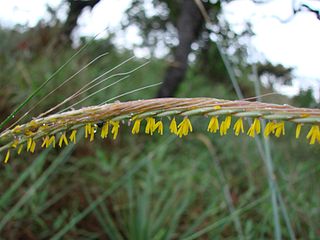Related Research Articles

Cymbopogon, also known as lemongrass, barbed wire grass, silky heads, oily heads, Cochin grass, Malabar grass, citronella grass or fever grass, is a genus of Asian, African, Australian, and tropical island plants in the grass family. Some species are commonly cultivated as culinary and medicinal herbs because of their scent, resembling that of lemons . The name cymbopogon derives from the Greek words kymbe and pogon "which mean [that] in most species, the hairy spikelets project from boat-shaped spathes." Lemongrass and its oil are believed to possess therapeutic properties.
Citronella may refer to:

Citronella oil is an essential oil obtained from the leaves and stems of different species of Cymbopogon (lemongrass). The oil is used extensively as a source of perfumery chemicals such as citronellal, citronellol, and geraniol. These chemicals find extensive use in soap, candles and incense, perfumery, cosmetic, and flavouring industries throughout the world.

Citronellal or rhodinal (C10H18O) is a monoterpenoid aldehyde, the main component in the mixture of terpenoid chemical compounds that give citronella oil its distinctive lemon scent.

Citral is an acyclic monoterpene aldehyde. Being a monoterpene, it is made of two isoprene units. Citral is a collective term which covers two geometric isomers that have their own separate names; the E-isomer is named geranial or citral A. The Z-isomer is named neral or citral B. These stereoisomers occur as a mixture, not necessarily racemic; e.g. in essential oil of Australian ginger, the neral to geranial ratio is 0.61.
The holy anointing oil formed an integral part of the ordination of the priesthood and the High Priest as well as in the consecration of the articles of the Tabernacle and subsequent temples in Jerusalem. The primary purpose of anointing with the holy anointing oil was to sanctify, to set the anointed person or object apart as qodesh, or "holy".

Cymbopogon ambiguus, or Australian lemon-scented grass, is a plant species in the family Poaceae. It has fragrant, bluish-green grey leaves and fluffy seed heads. It is self-fertile.

Cymbopogon flexuosus, also called Cochin grass, East-Indian lemon grass or Malabar grass, is a perennial grass native to India, Sri Lanka, Burma, and Thailand. It is placed in the genus Cymbopogon (lemongrasses).

Lagurus is a genus of Old World plants in the grass family, native to the Mediterranean Basin and nearby regions, from Madeira and the Canary Islands to Crimea and Saudi Arabia. It is also naturalized in Australia, New Zealand, the Azores, Ireland and Great Britain, and scattered locations in the Americas. The only known species is Lagurus ovatus, commonly called hare's-tail, hare's-tail grass or bunnytail. It is also grown as an ornamental plant for its attractive flower panicles.

Cymbopogon citratus, commonly known as West Indian lemon grass or simply lemon grass, is a tropical plant native to Maritime Southeast Asia and introduced to many tropical regions.

Cymbopogon martinii is a species of grass in the genus Cymbopogon (lemongrasses) native to India and Indochina but widely cultivated in many places for its aromatic oil. It is best known by the common name palmarosa as it smells sweet and rose-like. Other common names include Indian geranium, gingergrass, rosha, and rosha grass.

Piperitone is a natural monoterpene ketone which is a component of some essential oils. Both stereoisomers, the D-form and the L-form, are known. The D-form has a peppermint-like aroma and has been isolated from the oils of plants from the genera Cymbopogon, Andropogon, and Mentha. The L-form has been isolated from Sitka spruce.

Cymbopogon schoenanthus, the camel grass, camel's hay, straw of Mecca,fever grass, geranium grass, or West Indian lemon grass, is a herbal plant of Southern Asia and Northern Africa, with fragrant foliage.

Trachypogon is a small genus of African and Latin American plants in the grass family. Crinkleawn grass is a common name for plants in this genus.
Ch. Surender Singh Memorial Herbal Park, Kairu is a herbal and medicinal plant park in Kairu village between the cities of Bahal and Bhiwani in the Tosham tehsil of the Indian state of Haryana. It is also the location of a Chinkara Breeding Centre run by the Forests Department of the state government.

The Shatavar Vatika Herbal Park, Hisar, named after the shatavar herb, is a 125-acre herbal park for the conservation of several endangered ayurvedic medicinal herbs. It is located on Hisar-Dhansu road, which runs off 'Hisar-Barwala NH-52', in Hisar city of Haryana state in India.
Cymbopogon commutatus is a perennial grass species, commonly known as incense grass, aromatic rush, camel's hay, or lemon grass. Its range extends from South Asia to parts of Africa and Arabia. Foliage has a sweet lemony odor when mashed. It appeared on a 4 riyal Qatari stamp. It is used for medicinal purposes in northeastern Arabia.

Cymbopogon refractus, commonly known as barbed wire grass, is a species of perennial grass in the genus Cymbopogon of the family Poaceae. It is native to Australia.

Cymbopogon obtectus is a species of perennial grass in the genus Cymbopogon. The grass is native to Australia and was described by Stanley Thatcher Blake in 1944. It is found in drier areas. The plant can be harvested in the wild to produce essential oil with medicinal properties. The plant is resilient to climate change, and has been used in re-vegetation projects.

Cymbopogon winterianus, common name java citronella, is a perennial aromatic plant from the family Poaceae, originating in western Malesia. Used in perfumery products and cosmetics, a source of Citronella oil.
References
- ↑ Spreng. Pl. Min. Cogn. Pug. 2: 14 1815